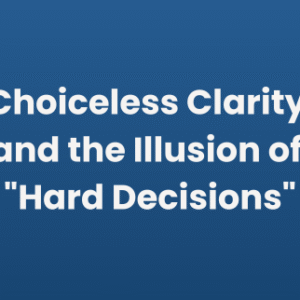After sitting in confidential conversations with leaders for a few thousand hours, I’ve come to fully appreciate that the unseen work of leadership is not in finding simple answers, but in developing our capacity to navigate complexity.
Complexity isn’t just about having many moving parts. It’s a state where those parts are interconnected and unpredictable, where cause and effect are unclear, and where contradictory forces are often at play simultaneously. Basically, it is our reality.
Reality rarely lends itself to a clean, linear process of problem-solving. It can often be handled only by the messy, uncomfortable, and generative act of holding the tensions that complexity creates.
Our minds, however, dislike paradox. Faced with the pressure of two competing, valid realities, our instinct is to collapse. The mind is a sense-making machine, and one of its primary functions is to create a coherent and predictable story about the world.
A paradox—where two opposing things look simultaneously valid and important—is a glitch in that story. It creates a deep psychological discomfort which overwhelms our mind. To escape this feeling, we seek the relief of a simple position. We collapse the complexity by choosing one pole and denying the other, trading a full truth for a more comfortable, simple story. And these tensions are everywhere in your world, once you start to look for them. A few come to my mind from my work with clients:
It’s the tension between the non-negotiable need to deliver the project on time and the equally real need to protect a tired team from burnout.
It’s the tension between investing in a bold, long-term vision and the pragmatic necessity of focusing on the core business that pays the bills today.
It’s the tension between insisting on a result and investing in a person’s development, especially when you need that result now.
It is the pressure to react instantly to a competitor’s move versus the wisdom of a slower, more deliberate strategic response.
It is the tension between the responsibility of caring for an ill spouse or a growing child, and the deep desire to continue building your legacy at work.
In my own life, for many years, I’ve grappled with the tension between speaking with the full force of my authority while simultaneously embodying the humility to know that I do not have all the answers.
Underneath these practical dilemmas, we can see a deeper pattern. It is also the tension between what is called the masculine (doing, structure, logic) and feminine (being, flow, intuition) energies within us.
It is the dance between our desire for linear, analytical order and our capacity for creative, holistic insight.
I’ve come to see that all these tensions are expressions of one, foundational paradox: the tension between our inner, spiritual sense of unboundedness and the practical, demanding realities of the material world.
The ancient Indian philosophy of Vedanta has a name for this: Maya.
As Swami Vivekananda describes it in his speech And This Is Maya, this complexity is the fundamental contradiction of our existence – experiencing ourselves as free while simultaneously being bound by the laws of nature.
The work of an Awakened Leader, then, is to be a bridge between the reality of being awake to spirit while living and leading in the material world.
We don’t have the luxury of choosing one over the other. Or we can say, we do have the luxury of experiencing both possibilities simultaneously.
Our work is to bring the depth and presence of our spiritual wakefulness to the concrete, demanding realities of the material world.
This is not a strategy; it is a state of being. It requires the cultivation of an inner stability, a center of presence that can act as a container for complexity. As a leader, you don’t just solve the problem for the team; you become the space in which the problem can be held and navigated with wisdom.
Many of the leaders I work with are navigating this kind of complexity, and they invest in working with me because they want a thinking partner who is able to see and hold this complexity without collapsing. While I do that, it is eventually only to enable them to develop that capacity within themselves.




